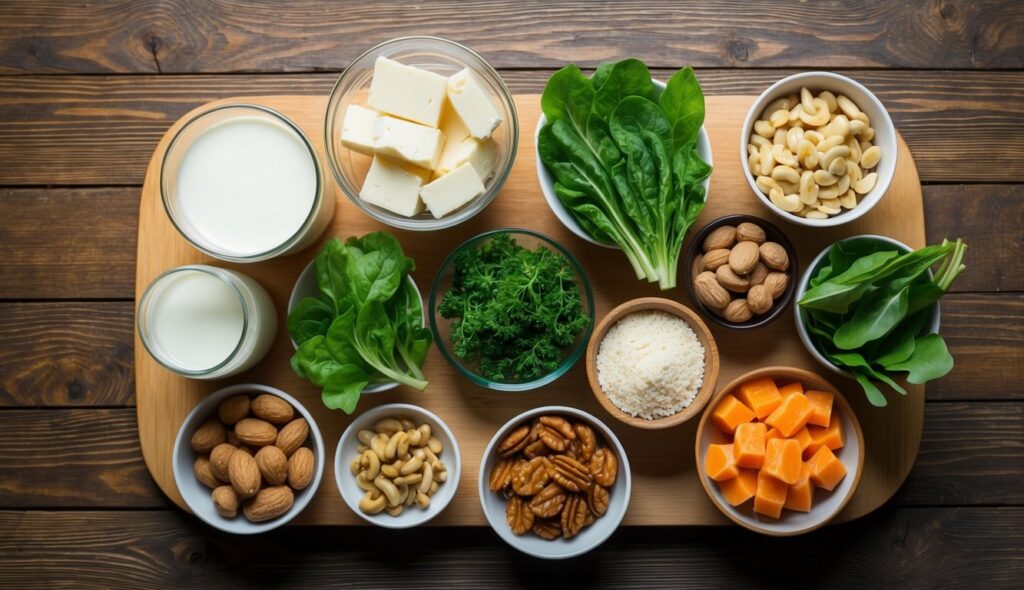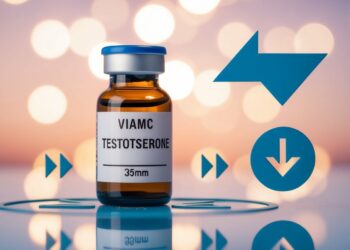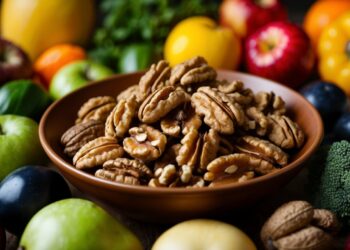As men age past 50, taking care of bone health becomes more important than ever. Your bones naturally begin to lose density, making them more fragile and at risk for fractures. Good nutrition plays a key role in keeping your skeleton strong and healthy.
Your bones need several essential nutrients to stay strong, including calcium, vitamin D, magnesium, phosphorous, and potassium. Getting enough of these through your diet or supplements helps maintain bone density and prevent osteoporosis. Calcium builds bone structure, while vitamin D helps your body absorb and use this important mineral effectively.
Beyond just preventing fractures, strong bones give you the foundation for an active lifestyle. Regular exercise, especially weight-bearing activities, works together with good nutrition to keep your skeleton sturdy. Avoiding smoking and limiting alcohol also protect your bone health. With the right nutrients and lifestyle choices, you can maintain your energy and mobility well into your later years.
Understanding Bone Health and Nutrition
Proper nutrition plays a vital role in maintaining strong bones, especially for men over 50. Your bones rely on specific nutrients to stay healthy and prevent conditions like osteoporosis and fractures.
The Link Between Nutrition and Bone Health
Your bones are living tissues that constantly rebuild themselves through a process called remodeling. Without the right nutrients, this process can’t work properly, leading to weak bones and increased fracture risk.
After 50, men start losing bone density at a rate of about 0.5% to 1% per year. This makes good nutrition even more important for you at this stage of life.
Poor eating habits contribute to low bone density and osteoporosis. Studies show that diets rich in fruits, vegetables, and lean proteins help maintain bone strength.
Think of your bones as a bank account – you need to deposit nutrients regularly to maintain a healthy balance and prevent bone loss.
Role of Calcium and Vitamin D in Bone Strength

Calcium is your bones’ building block, making up about 99% of your bone mineral content. Men over 50 need about 1,000-1,200 mg of calcium daily to maintain bone health.
Good calcium sources include:
- Dairy products (milk, yogurt, cheese)
- Fortified plant milks
- Leafy greens (kale, collards)
- Canned fish with bones
Vitamin D is equally important as it helps your body absorb calcium. Without enough vitamin D, you can consume adequate calcium but still lose bone density.
Most men over 50 need 800-1,000 IU of vitamin D daily. Your body makes vitamin D when exposed to sunlight, but aging skin becomes less efficient at this process.
Vitamin D food sources include fatty fish, egg yolks, and fortified foods, though supplements are often needed.
Significance of Protein and Other Nutrients
Protein makes up about 50% of your bone volume and 33% of its mass. It creates the framework that minerals attach to in bones.
Men over 50 should aim for 0.8-1.0 grams of protein per kilogram of body weight daily. Quality protein sources include lean meats, fish, eggs, dairy, and plant proteins like beans and nuts.
Beyond calcium, vitamin D, and protein, your bones need:
- Magnesium: Helps convert vitamin D to its active form
- Potassium: Neutralizes acids that can remove calcium from bones
- Vitamin K: Activates proteins involved in bone formation
Emerging research suggests olive oil, omega-3 fatty acids from fish, and antioxidants from fruits like blueberries may protect bone health by reducing inflammation.
Too much sodium, alcohol, and caffeine can harm your bones by increasing calcium excretion.
Optimal Dietary Practices for Men Over 50
As men age, their bodies need specific nutrients to maintain strong bones and prevent conditions like osteoporosis. The right dietary choices can make a big difference in bone density and overall skeletal health.
Incorporating Calcium-Rich Foods
Calcium forms the foundation of your bone structure, and your needs don’t decrease with age. Aim for 1,000-1,200mg of calcium daily through your diet.
Dairy products like milk, yogurt, and cheese are excellent sources – just one cup of yogurt provides about 30% of your daily needs. If you’re lactose intolerant, don’t worry!
Try these calcium-rich alternatives:
- Fortified plant milks (almond, soy)
- Leafy greens like kale and collard greens
- Canned sardines or salmon (with bones)
- Tofu made with calcium sulfate
Spread your calcium intake throughout the day rather than consuming it all at once. Your body absorbs smaller amounts more efficiently.
Vitamin D and Sunlight Exposure
Vitamin D is essential for calcium absorption – without it, your calcium intake won’t effectively strengthen bones. Men over 50 should aim for 800-1,000 IU daily.
Your body produces vitamin D when your skin is exposed to sunlight. Try to get 10-15 minutes of direct sun on your arms and face a few times weekly.
During winter or if you live in northern regions, dietary sources become crucial:
- Fatty fish like salmon and mackerel
- Egg yolks
- Fortified foods (milk, orange juice, cereals)
Many men over 50 benefit from vitamin D supplements, especially during winter months. Talk to your doctor about testing your levels.
Importance of Magnesium and Zinc
Magnesium and zinc play supporting but vital roles in bone health that many men overlook. Magnesium helps activate vitamin D and supports bone crystal formation.
Good magnesium sources include:
- Nuts (especially almonds)
- Whole grains
- Beans and lentils
- Dark chocolate (in moderation)
Zinc contributes to bone-forming cells and the bone matrix. Men need 11mg daily, which you can get from:
- Oysters and other shellfish
- Beef and poultry
- Pumpkin seeds
- Chickpeas
Try to incorporate magnesium and zinc-rich foods into your daily meals. These minerals work with calcium and vitamin D to keep your bones strong and resilient.
Lifestyle Factors Influencing Bone Health
Your daily habits play a crucial role in maintaining strong bones as you age. Diet alone isn’t enough—how you move your body and manage hormonal changes can make a significant difference in your bone density.
Benefits of Regular Exercise
Regular physical activity directly strengthens your bones. When you exercise, especially with weight-bearing movements, you create gentle stress on your bones that triggers them to build more tissue and increase density.
Walking, jogging, tennis, and dancing are excellent weight-bearing exercises that help maintain bone strength. Aim for at least 30 minutes of these activities most days of the week.
Strength training exercises are particularly effective for bone health. Try using free weights, resistance bands, or weight machines 2-3 times weekly. These exercises target specific bones and muscle groups, helping to prevent age-related bone loss.
Balance exercises like tai chi can also help prevent falls—a major concern for men with weakened bones.
Managing Hormonal Changes After 50
After 50, your hormone levels naturally shift. Testosterone gradually decreases by about 1% yearly, which can affect bone density since this hormone helps maintain bone mass.
Talk to your doctor about checking your hormone levels. Low testosterone might contribute to bone loss and can sometimes be addressed with lifestyle changes or medical treatments.
Unlike women who experience rapid bone loss during menopause due to estrogen decline, your bone density changes more gradually. However, this doesn’t mean you can ignore hormonal health!
Getting enough sleep, managing stress, and maintaining a healthy weight all support balanced hormone levels. Chronic stress increases cortisol, which can harm bone density when elevated for long periods.
Supplementation Strategies
While a balanced diet is the best way to get bone-building nutrients, supplements can help fill nutritional gaps for men over 50. Proper supplementation can support bone health when dietary intake falls short.
When to Consider Supplements
You should consider supplements if you have limited sun exposure, which affects vitamin D production. Many men over 50 don’t get enough calcium and vitamin D from food alone.
If you have digestive issues that reduce nutrient absorption, supplements may be necessary. Talk to your doctor about testing for vitamin D levels before starting supplements.
Men with dairy allergies or lactose intolerance might need calcium supplements since they miss out on this rich source. If you follow a vegan diet, you may need supplements for calcium, vitamin D, and vitamin B12.
Choosing the Right Supplements
Look for calcium citrate rather than calcium carbonate, as it’s easier to absorb, especially if you take acid-reducing medications. The recommended daily amount is 1,000-1,200 mg of calcium for men over 50.
For vitamin D, choose vitamin D3 (cholecalciferol) over D2, as it raises blood levels more effectively. Most men need 800-1,000 IU daily.
Consider these guidelines when selecting supplements:
- Choose reputable brands tested by third parties
- Take calcium in divided doses (500 mg or less) for better absorption
- Pair calcium with vitamin D for improved absorption
- Look for supplements with vitamin K2, which helps direct calcium to bones
Always check with your healthcare provider before starting any new supplement routine.








